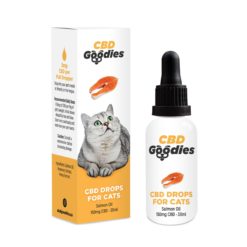CBD Oil for Pets
CBD for Pets
Pets can suffer from the same ailments that their owners can. It is for this reason that CBD for pets is rapidly gaining popularity in Canada. CBD is said to promote increased happiness, mood, relaxation, and overall health of dogs and cats. Whether it be aches and pains, or anxiety, CBD can benefit dogs and cats in a variety of ways. The most common CBD products for dogs and cats are CBD oil, CBD treats, and CBD topicals.
An Introduction to CBD for Dogs and Cats
Many dogs and cats are loved by their owners, and treated like one of the family. So when such pets come down with medical complications such as chronic pains and/or anxiety, many owners want something that will help bring comfort to their pets. One thing that many pet users have been experimenting with is CBD for pets. CBD is a non psychoactive compound found in marijuana and hemp plants, and has been providing many dogs and cats relief from many different conditions.
Effects of CBD Dogs and Cats
- Benefits of CBD Pets: The most common therapeutic effects of CBD oil for dogs and cats is increases in mood, health and relaxation.
- Medical Uses of CBD Pets: The list of medical uses of CBD for dogs and cats is long and encompassing. Some of the most common of these uses include for relief from anxiety, aches, pains and inflammation.
- Negative Effects of CBD Pets: CBD was deemed relatively safe by the World Health Organization. However, it is possible for dogs and cats to experience dehydration and restlessness. However, these are rare and often go unnoticed.
Different Types of CBD Products for Pets
The most common CBD products for dogs and cats include CBD oil for pets, CBD dog treats and CBD topicals. These products are crafted especially for dogs or cats and provide them with similar benefits that humans enjoy.
Guidelines to Follow When Shopping for CBD for Dogs in Canada
Every day, scientists work towards providing more information about the side effects of cannabidiol. This means that CBD could cause some discomfort to your dog. This could happen if you don’t use it right or you purchase it wrongly. For that reason, you must keep certain things in mind on your next CBD run. Notable among them are:
- Always shop for organic CBD products
CBD products are generally safe. We’ve established this before, according to the World Health Organization. However, a few things could put a question mark on their safety. One of them is the use of inorganic compounds.
You want to ensure that the CBD oil for dogs you purchase is organic at all times. If your producer or manufacturer is adding other chemicals, it could be potentially harmful to your dog. To confirm the organic viability of your products, you can simply check the list of ingredients. There, you’ll likely find the names of inorganic compounds used to produce your CBD. If not, you’ll find things that’ll hint at inorganic production.
However, in worst-case scenarios, you might be unable to determine what compounds were used. In that case, you should at least try to confirm if it contains any herbicides or pesticides. By doing so, you’ll be encouraging organic farming and all its benefits. This is beside the positive impact you’ll be having on your dog.
Keep in mind that if you can’t confirm the ingredients, that might be a red flag. All manufacturers should be transparent enough to display the compounds forming their products.
- Don’t look at the cost alone
When you’re trying to get a new product, the chances are that your main consideration is the cost. We understand and this is very normal. After all, you wouldn’t want to spend too much money when you have other things on your budget. However, you might want to have a rethink when shopping for hemp oil for dogs.
The reason is that CBD often costs more when the quality is higher than average. This is the same with most other products. So, be careful about disqualifying a product from your grocery list based on cost. The best thing to do would be to look for the optimal combination of affordability and quality.
That is, if the product is of very high quality with a third-party test certificate and all, it should be within your budget. If it isn’t, and your budget is adjustable, go for it. If your budget is static, then look for the next best thing. Whatever you do, just don’t write off any product immediately if you see high prices. At least if you want the best for your dog.
- Check the analysis of your preferred product
In the previous point, we mentioned something about a third-party test certificate. Granted, it might’ve come across as a bit casual. However, a third-party test certificate has a significant role to play in guaranteeing the safety of your CBD product.
To put things in perspective, it is important that you first understand what a third-party test is. As the name implies, it’s a test conducted by an external agency/organization/body. It’s often a requirement for different human and animal consumables. The test’s primary purpose is to show if the product being tested is safe for those it was intended for. In the CBD industry, third-party tests are incredibly important.
So, before buying a product for your dog, check to see if it has a third-party test. If it is, go through it as thoroughly as possible to determine if the product is right for your pet. Once you do, and you’re satisfied with what you see, you can go ahead and buy. If the product doesn’t have a third-party test at all, you might want to give it a wide berth.
One thing you should look out for is the presence and quantity of THC in the CBD product. If it’s there and it’s too much, you’ll end up getting your dog high instead of relaxed. This is true, considering its effects on man.
- Buy as a liquid
There are many different ways you can give your dog or cat CBD. Of course, they can’t exactly vape like humans. They can still eat treats containing CBD. However, the problem with treats comes with dosing.
There’s the chance that manufacturers might’ve densely concentrated CBD in the snack. On the other hand, they might’ve put so little that it doesn’t do anything for your pet. This could be possible if you have a big dog or cat.
The best way to gain control is by simply getting the drug as a liquid. That way, you can easily control how much your dog will take at any point in time. With this method, you can avoid overdosing your pet and causing them major discomfort.
- Consult your veterinarian when in doubt
The knowledge a professional has to offer will be of much more significance than yours. So, do your best to consult your professional whenever you have doubts. This could be:
- When you don’t know how much dosage is right for your pet
- When your pet has an underlying health condition
- When you’re worried about a drug-CBD interaction
By consulting your veterinarian, you can rest assured that you’ll stand on better footing.
How Much CBD Should You Give Your Pets?
Before determining the answer to this, you need first to know the concentration of CBD in the product. This is where it’s helpful to buy CBD in its liquid state. A single-ounce bottle might contain up to 1000mg of CBD. You can check the label for specific details.
Regardless, you can give your dog between 1mg of CBD to 3mg for every ten pounds of body weight. To put that in perspective, a dog that weighs fifty pounds can get up to 15mg of CBD per day.
For a five-pound cat, you can administer up to 2mg per day. For a fifteen-pound cat, you can go for 4mg per day. You should ensure that you split the CBD dosage equally throughout the day. That way, you can ensure that the pet feels the effects for extended periods. Also, you’ll know that you’re not overdosing your pet.
Best Place to Buy CBD Products for Pets in Canada?
The best place to buy CBD for pets is at Weed Smart, the most trusted online dispensary in Canada. We offer a wide range of CBD products for pets and their owners. So come join the CBD community and improve the quality of your life and experience the plentiful benefits that CBD has to offer you and your pets. So become a member of our community and shop smart, shop WeedSmart.
Sources:
- Peter Grinspoon. Cannabidiol (CBD) — what we know and what we don’t. Accessed February 8, 2021 at https://www.health.harvard.edu/blog/cannabidiol-cbd-what-we-know-and-what-we-dont-2018082414476.
- The World Health Organization. CANNABIDIOL (CBD). Pre-Review Report. Agenda Item 5.2. Accessed February 8, 2021 at http://www.who.int/medicines/access/controlled-substances/5.2_CBD.pdf.
- Mateus Machado Bergamaschi, Regina Helena Costa Queiroz, Antonio Waldo Zuardi, Alexandre S Crippa. Safety and side effects of cannabidiol, a Cannabis sativa constituent. Accessed February 8, 2021 at https://www.ingentaconnect.com/content/ben/cds/2011/00000006/00000004/art00005.
- Kerstin Iffland, Franjo Grotenhermen. An update on safety and side effects of cannabidiol: a review of clinical data and relevant animal studies. Accessed February 8, 2021 at https://www.liebertpub.com/doi/abs/10.1089/can.2016.0034.
- Anna Haering, S Dabbert, F Offermann, H Nieberg. Benefits of organic farming for society. Accessed February 8, 2021 at https://www.researchgate.net/profile/Anna_Haering2/publication/233425817_Benefits_of_Organic_Farming_for_Society/links/00b7d53299ac16a2a7000000/Benefits-of-Organic-Farming-for-Society.pdf.
- B James Deaton. A theoretical framework for examining the role of third-party certifiers. Accessed January 8, 2021 at https://www.sciencedirect.com/science/article/pii/S0956713503001671.
- Isac G Karniol, Itiro Shirakawa, Reinaldo N Takahashi, Elias Knobel, Richard E Musty. Effects of Δ9-tetrahydrocannabinol and cannabinol in man. Accessed February 8, 2021 at https://www.karger.com/Article/Abstract/136944.


